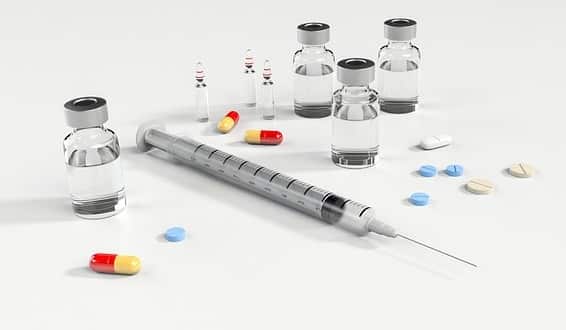Most people think that prescription drugs are harmless because you get a prescription from a doctor to purchase it. If you believe this to be true, you really have to reconsider.
According to the Center for Disease Control and Prevention (CDC), prescriptions drugs kill about 44 people per day. Even highly-effective drugs carry a long list of adverse effects. Below you can learn more about the side effects of hydrocodone, barbiturates, cough suppressants, and many more.
Here are the top ten medications that most people don’t know are addictive:
Who would have thought a drug as common as Loperamide can be addictive? According to DrugAbuse.gov, an anti-diarrheal drug like Loperamide contains dextromethorphan (DXM), an ingredient also found in cough suppressants. DXM is also an opioid drug, however, it does not reduce pain and does not bind itself to the brain’s opioid receptors. However, if you take huge doses of this drug, you can experience hallucinogenic and depressant effects. Though Loperamide doesn’t enter the brain, if mixed with other substances and if taken in large amounts, it can cause euphoria, withdrawal symptoms, and other effects associated with opioid drug addiction.
According to a different article published by DrugAbuse.gov, these types of medications belong to the prescription Central Nervous System (CNS) depressants and are known to treat sleep disorders, acute stress reaction, and anxiety disorder since it slows down the brain’s activities.
If a person overdoses on tranquilizers, they might experience slowed breathing. In extreme cases, they might stop breathing completely. This drug can lessen the oxygen going to the brain, thus resulting in a condition known as hypoxia. Hypoxia can affect one’s nervous system and such effects can lead to interminable brain damage and coma.
- Sleep Medications
Sleeping aids, according to WebMD, are categorized as sleep hypnotics because they work by maintaining or inducing sleep. Examples of popular brands of these medications are Lunesta and Ambien. Like tranquilizers, these types of drugs slow down brain activity, thus causing slowed breathing, low blood pressure, memory problems, movement difficulties, dizziness, confusion, poor concentration, slurred speech, and drowsiness.
DXM is short for Dextromethorphan which is commonly found in cough medications. Like in Loperamide, DXM is an opioid that has no effect on the brain since it does not act on the brain’s opioid receptors. Then again, if consumed in huge doses, it can cause hallucinogenic and depressant effects similar to that of an opioid drug. Examples of brands with DXM according to StopMedicineAbuse.org are Vicks Formula 44, Vicks DayQuil, Robitussin, Tylenol Cough & Cold, and more.
This drug type, according to Drugs.com, belongs to the central nervous system stimulant category. They work by affecting the nerves and brain chemicals that control impulses and contributes to a person’s hyperactivity.
Methylphenidate is used to treat narcolepsy, attention deficit hyperactivity disorder (ADHD), and attention deficit disorder (ADD). If abused or used, if you have a history of depression or mental illness, this drug can contribute to worsening of one’s psychosis.
Since it’s a stimulant, used in large quantities, it can cause heart attack, stroke, or even death.
According to Medline Plus, hydrocodone is habit forming, thus it should only be taken as prescribed by your doctor.
In a study conducted by the Drug Enforcement Administration, it was said that this is a narcotic analgesic and an antitussive drug. Hydrocodone is used to treat light to moderate pain.
Side effects of hydrocodone include the following:
- Constipation
- Light-headedness
- Lethargy
- Itching
- Seasickness
- Drowsiness
According to Medical News Today, amphetamines also belong to the central nervous system stimulant category and are used to treat narcolepsy and ADHD. This drug is addictive since it acts by activating the brain’s neurotransmitters like dopamine and norepinephrine.
Just like the side effects of hydrocodone, abuse of this drug can also lead to a number of adverse effects provided as follows:
- Delusions
- Psychosis
- Paranoia
- Hostility
- Cardiovascular problems
- Decrease of Cognitive Ability
- Malnutrition
- Muscle breakdown
Pseudoephedrine, according to the Journal of Neuropsychiatry and Clinical Neurosciences, is a commonly used remedy for nasal congestion despite its stimulant properties. People who abuse this drug are after its effects like hallucinations and extreme “body high”.
Abuse of pseudoephedrine can result in dizziness, seizures, shortness of breath, high blood pressure, and irregular heartbeat.
According to the US National Library of Medicine, dimenhydrinate belongs to the family of antihistamines and is used to treat vertigo, dizziness, nausea, and motion sickness. If taken in large doses, this drug can cause coma, seizures, irregular heartbeat, nausea, ear ringing, hallucinations, and even death. Most people abuse this drug due to its psychedelic properties.
10.Barbiturates
This drug is also known for its commercial names like Phenobarbital, Nembutal, Amytal, and Seconal. In the streets, it’s known as yellow jackets, yellows, tooies, reds, or barbs.
Being a sedative and depressant drug, barbiturates help people sleep by relaxing their bodies. This type of drug can cause dependence and tolerance. Most people abuse it for its euphoric and relaxing effects.
If you or a loved one is addicted to any of these medications, seek help now. Don’t wait until your symptoms are serious before you get treatment. Call an Addiction Specialist today and redeem your sobriety.
Patrick Bailey is a professional writer mainly in the fields of mental health, addiction, and living in recovery. He attempts to stay on top of the latest news in the addiction and the mental health world and enjoy writing about these topics to break the stigma associated with them.
Liked this article? Share it to say “thanks!” Your support is much appreciated!








1 Comment
Pingback: Clove Oil: In finding Out Now, The 7 Best Negative effects of It! - Mypressnews